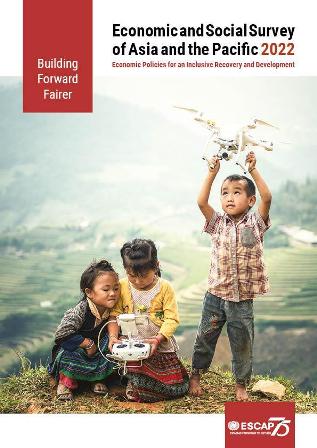Adopt a New Social Contract for Inclusive Recovery, Says UN
The ESCAP Survey highlights the roles that fiscal, monetary and structural policies can play in the quest for building an inclusive stakeholder economy.
In the context of continuing uncertainty over the trajectory of the COVID-19 pandemic and increased global risks, the Asia and the Pacific Region’s economic recovery and progress must be anchored in “a new social contract” of inclusiveness to protect the vulnerable from future shocks, according to the Economic and Social Survey of Asia and the Pacific for 2022 by the United Nations Economic and Social Commission for Asia and the Pacific (ESCAP).
global risks, the Asia and the Pacific Region’s economic recovery and progress must be anchored in “a new social contract” of inclusiveness to protect the vulnerable from future shocks, according to the Economic and Social Survey of Asia and the Pacific for 2022 by the United Nations Economic and Social Commission for Asia and the Pacific (ESCAP).
In addition to the pandemic, the report shows that regional economies face several downside risks related to supply constraints, rising inflationary pressures, prospects of increases in interest rates, shrinking fiscal space, and the emerging global economic fallout from the ongoing Russia-Ukraine conflict. The overall economic growth in developing countries in Asia and the Pacific, estimated at 7.1 per cent in 2021, is projected to moderate to 4.5 per cent in 2022 and 5 per cent in 2023. Inflation has risen across the region, driven by growing food and fuel prices, affecting the poor disproportionately. The cumulative output loss due to COVID-19 for the region’s developing economies between 2020 and 2022 is estimated to be nearly USD 2 trillion.
With dwindling fiscal space in many developing countries in the region, the ESCAP Survey cautions against cuts in fiscal expenditures on health care, education and social protection to protect the development gains of past decades and prevent further deepening of inequalities in the region.
The pandemic has denied more than 820 million informal workers and over 70 million children in low-income households in the region adequate access to income and schooling.
This outcome will have scarring effects on the future earning potential of these persons and overall productivity growth. An additional 85 million people in Asia and the Pacific had already been pushed back into extreme poverty in 2021. The ongoing challenges are likely to impede further progress toward implementing the 2030 Agenda for Sustainable Development.
“As developing countries in the region move ahead with learning to live with COVID-19, balancing the protection of public health and livelihoods, it is time to lay the foundations for a fairer future of equal opportunities and inclusive outcomes,” said Armida Salsiah Alisjahbana, UN Under-Secretary-General and Executive Secretary of ESCAP.
Policymakers need to be aware of impending risks, including the possible emergence of new variants of the COVID-19 virus and the ongoing geopolitical conflict. Continued economic disruptions can adversely impact productive capacities and long-term productivity through shorter working hours and a lack of employment opportunities, eroding worker skills. Moreover, women have been disproportionately affected by the pandemic within the region. Many of them were employed in sectors most severely affected by the pandemic, and many were engaged in informal employment.
ESCAP recommends a three-pronged policy agenda to shape an inclusive economy in Asia and the Pacific. First, instead of reductions, developing countries in the region must tilt public spending towards basic universal health coverage, push further towards universal primary and secondary education, and expand social protection coverage. “Smart” fiscal policies can improve the overall efficiency and impact of public spending and revenue collection. Concurrently, new sources of revenue should be explored, such as taxing the digital economy, along with shifting the tax burden towards those better off.
Second, the 2022 Survey argues that central banks in the region can and should tilt their traditional monetary policy towards promoting inclusive development. While remaining focused on keeping inflation low and stable, central banks can invest part of official reserves in social bonds, explore how a central bank digital currency can enhance financial access, and encourage more innovative financial instruments for social purposes.
The Survey for 2022 examines how the central bank’s roles in monetary policymaking, official reserve management, currency issuance and financial sector regulation can promote more inclusive societies. While monetary policy has indirectly helped the poor by keeping inflation low and stable, central banks can also consider the impact of monetary policy on income and wealth distribution, even raising ambitions to make economic equality a secondary goal and allocating part of asset purchases to domestic social bonds.
Third, Governments can also proactively guide, shape and manage the structural economic transformation process, which is increasingly driven by the digital-robotics-AI revolution, for more inclusive outcomes. This includes supporting the development of labour-intensive technologies, inclusive access to good-quality education, reskilling, strengthening labour negotiation capacities and social protection floors.
First produced in 1947, the Economic and Social Survey of Asia and the Pacific is the UN’s oldest and most comprehensive annual socioeconomic study informing policymaking in the region. This year’s Survey analysed the importance of practical government actions and the role of fiscal, monetary and structural policies in enhancing inclusiveness, keeping in view the considerable adverse impacts of COVID-19 on poverty and inequality.
